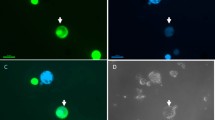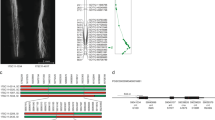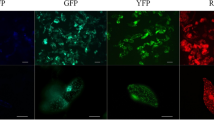Abstract
SOMATIC cell hybridization is a potentially useful technique for the introduction of genetic variability into plant species. One proposed method involves fusion of plant protoplasts (which is a cell lacking its wall—defined here on the basis of light microscope examination) to form a hybrid cell which can be induced to form a plant1. Plant protoplasts produced by the use of crude, commercial lytic enzymes are not always healthy (as defined by consideration of factors such as cytoplasmic streaming, presence of cytoplasmic strands and position of the nucleus within the cell, in relation to survival time)2,3. Peroxidase2, basic proteins3 and ribonuclease4 have been implicated as possible deleterious agents. The use of purified enzymes offers a more rigorously defined system for obtaining healthy protoplasts. We have used purified preparations of cellulase (EC 3.2.1.4), pectate lyase (EC 4.2.99.3) and endopolygalacturonase (EC 3.2.1.15) to prepare protoplasts from a range of plant cell suspension cultures. We have also prepared inducible streptomycete enzymes lytic towards plant cell walls.
This is a preview of subscription content, access via your institution
Access options
Subscribe to this journal
Receive 51 print issues and online access
$199.00 per year
only $3.90 per issue
Buy this article
- Purchase on Springer Link
- Instant access to full article PDF
Prices may be subject to local taxes which are calculated during checkout
Similar content being viewed by others
References
Nickell, L. G., and Torrey, J. G., Science, 166, 1068 (1969).
Schenck, R. U., and Hildebrandt, A. C., Crop Sci., 9, 629 (1969).
Takebe, I., Otsuki, Y., and Aoki, S., Plant Cell Physiol., 9, 115 (1968).
Ruesink, A. W., and Thimann, K. V., Proc. US Nat. Acad. Sci., 54, 56 (1965).
Gamborg, O. L., and Eveleigh, D. E., Canad. J. Biochem., 46, 417 (1969).
Albersheim, P., in Methods in Enzymology (edit. by Neufeld, E. F., and Ginsburg, V.), 8, 628 (Academic Press, New York, 1966).
Phaff, H. J., in Methods in Enzymology (edit. by Neufeld, E. F., and Ginsburg, V.), 8, 636 (Academic Press, New York, 1966).
Norkrans, B., Adv. Appl. Microbiol., 9, 91 (1967).
Power, J. B., and Cocking, E. C., Biochem. J., 111, 33p (1969).
Smith, I., Chromatographic and Electrophoretic Techniques, I, 250 (Heinemann, London, 1960).
Eriksson, T., and Jonasson, K., Planta, 89, 85 (1969).
Sietsma, J. H., Eveleigh, D. E., and Haskins, R. H., Antonie van Leeuwenhoek, 34, 331 (1968).
Bateman, D. F., Neth. J. Plant. Pathol., 74, 67 (1968).
Karr, A., and Albersheim, P., Eleventh Intern. Bot. Cong., 108 (1969).
Mishra, A. K., and Colvin, J. R., Protoplasma, 67, 295 (1969).
Pojnar, E., Willson, J. H. M., and Cocking, E. C., Protoplasma, 64, 460 (1967).
Author information
Authors and Affiliations
Rights and permissions
About this article
Cite this article
KELLER, W., HARVEY, B., GAMBORG, O. et al. Plant Protoplasts for Use in Somatic Cell Hybridization. Nature 226, 280–282 (1970). https://doi.org/10.1038/226280a0
Received:
Issue Date:
DOI: https://doi.org/10.1038/226280a0
This article is cited by
-
Potentials of protoplast culture work in agriculture
Euphytica (1974)
-
Methodische Aspekte der Zell- und Gewebezüchtung bei Gramineen unter besonderer Berücksichtigung der Getreide
Die Kulturpflanze (1974)
-
Cell division and plant development from protoplasts of carrot cell suspension cultures
Planta (1972)
-
Intra and Interspecific Fusion of Protoplasts from Petals of Torenia baillonii and Torenia fournieri
Nature New Biology (1971)
Comments
By submitting a comment you agree to abide by our Terms and Community Guidelines. If you find something abusive or that does not comply with our terms or guidelines please flag it as inappropriate.



